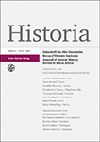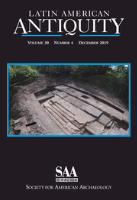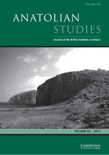
Vestnik Drevnei Istorii-Journal of Ancient History
Scope & Guideline
Pioneering Research at the Intersection of Disciplines
Introduction
Aims and Scopes
- Interdisciplinary Approaches to Ancient Studies:
The journal promotes an interdisciplinary approach, incorporating archaeology, philology, history, and anthropology to provide a comprehensive understanding of ancient cultures and civilizations. - Focus on Ancient Texts and Inscriptions:
A significant portion of the research involves the analysis of ancient texts and inscriptions, providing insights into historical events, social structures, and cultural practices of ancient societies. - Research on Ancient Economies and Trade Systems:
The journal often features studies on the economic practices of ancient civilizations, including trade networks, currency, and commerce, shedding light on the interconnectedness of ancient societies. - Cultural and Religious Practices:
Articles frequently explore the religious beliefs and cultural practices of ancient peoples, examining how these elements influenced their societies and historical trajectories. - Archaeological Discoveries and Interpretations:
The journal publishes findings from recent archaeological excavations, offering new interpretations of ancient artifacts and their significance in historical contexts.
Trending and Emerging
- Digital Humanities in Ancient Studies:
An increasing number of articles are exploring the intersection of digital humanities with ancient studies, utilizing digital tools to analyze texts, artifacts, and archaeological data. - Environmental Archaeology:
Research focusing on the environmental contexts of ancient civilizations is on the rise, examining how climate and geography influenced societal development and sustainability. - Social History and Everyday Life:
There is a growing trend towards investigating the daily lives, social structures, and experiences of common people in ancient societies, moving beyond elite narratives. - Cross-Cultural Interactions:
Studies examining interactions between different ancient cultures, including trade, migration, and cultural exchange, are increasingly prominent, reflecting a more global perspective in ancient history. - Re-evaluation of Ancient Economies:
Recent publications are emphasizing the complexities of ancient economies, including informal economies and local trade practices, challenging traditional models of economic understanding.
Declining or Waning
- Traditional Military History:
While military history has been a staple in ancient studies, recent publications indicate a waning interest in traditional military narratives, possibly due to a growing emphasis on social and cultural histories. - Focus on Major Historical Figures:
There appears to be a decreasing emphasis on the lives and actions of prominent historical figures, as scholars turn their attention to broader societal dynamics and collective experiences. - Classical Reception Studies:
The study of how ancient texts and themes have been received in later periods is becoming less prevalent, suggesting a shift away from this area towards more direct analyses of ancient societies themselves. - Colonial and Imperial Studies:
Research focusing on colonial and imperial perspectives within ancient history is declining, possibly as the field seeks to decolonize its narratives and explore indigenous perspectives. - Methodological Rigor in Historical Narratives:
There is a noticeable reduction in articles that prioritize strict methodological frameworks in historical narratives, indicating a shift towards more narrative-driven and thematic explorations.
Similar Journals

Journal of Ancient History and Archaeology
Bridging the Past and Present with Scholarly ExcellenceJournal of Ancient History and Archaeology is a premier, open-access academic journal published by MEGA PUBLISHING HOUSE since 2014, dedicated to exploring the rich tapestry of ancient civilizations and archaeological discoveries. With ISSN 2360-266X, this journal has made significant strides in the field, achieving elevated rankings across multiple categories, including Q1 in Classics and Q2 in History as of 2023. Positioned in Romania, the journal serves an international audience of researchers, professionals, and students who seek to disseminate and access influential scholarship in ancient history and archaeology. As a prominent resource within the Scopus rankings, it reflects a robust commitment to advancing knowledge through quality research, making it a vital platform for the sharing and discussion of innovative ideas and methodologies. The journal covers a wide array of topics related to ancient societies, enhancing our understanding of their cultural, historical, and archaeological significance.

HISTORIA-ZEITSCHRIFT FUR ALTE GESCHICHTE
Unveiling the Past: Where Ancient Insights Illuminate Modern ScholarshipHISTORIA-ZEITSCHRIFT FUR ALTE GESCHICHTE, published by FRANZ STEINER VERLAG GMBH, is a premier open-access journal dedicated to the rigorous exploration of ancient history, bridging critical insights from classics and historical studies since its inception in 1976. This distinguished publication, recognized with a Q1 ranking in both Classics and History for 2023, serves as a vital platform for researchers, professionals, and students alike, fostering interdisciplinary dialogue and advancing scholarship in the field. With a notable standing in Scopus, ranking #12 out of 170 in Classics and #288 out of 1760 in History, it addresses pivotal topics and emerging trends relevant to contemporary historiography. The journal’s commitment to open access, established in 2010, ensures that knowledge is widely disseminated, cultivating an inclusive academic community. For those dedicated to uncovering the nuances of ancient civilizations, HISTORIA remains an indispensable resource that significantly contributes to the global discourse on our historical heritage.

Journal of Ancient Near Eastern History
Fostering Dialogue on Ancient Cultures and Their ImpactJournal of Ancient Near Eastern History, published by Walter de Gruyter GmbH, is a pioneering platform dedicated to the exploration and analysis of the ancient Near East, spanning topics such as archaeology, history, and cultural studies. With its ISSN 2328-9554 and E-ISSN 2328-9562, this journal engages a diverse audience of researchers, professionals, and students who are eager to deepen their understanding of this historically rich region. Although currently not an open access journal, its rigorous peer-review process ensures that each publication maintains high scholarly standards. Aimed at fostering interdisciplinary dialogue, the Journal of Ancient Near Eastern History serves as an essential resource for anyone interested in the complexities of ancient civilizations, their legacies, and their relevance in contemporary society. With a commitment to advancing scholarship in this field, the journal is poised to contribute valuable insights and foster critical discussions among historians and archaeologists alike.

BULLETIN OF THE INSTITUTE OF HISTORY AND PHILOLOGY ACADEMIA SINICA
Navigating the Complexities of Human Culture.BULLETIN OF THE INSTITUTE OF HISTORY AND PHILOLOGY ACADEMIA SINICA is a distinguished academic journal published by the Academia Sinica's Institute of History and Philology, based in Taiwan. Focused on the interdisciplinary fields of history, linguistics, archaeology, and religious studies, this journal provides a scholarly platform for researchers and professionals seeking to disseminate innovative findings and theoretical advancements. Despite its recent Q4 categorization in several areas including archaeology and linguistics, the journal is committed to fostering rigorous dialogue and enriching the academic community's understanding of historical and philological nuances. As an essential resource for those invested in the humanities, particularly within the context of Asian studies, it remains dedicated to enhancing visibility and accessibility to pivotal research. While currently not an open-access publication, it continues to shape the discourse within its field through concise contributions from credible scholars. Join the journal's ongoing mission to illuminate the complexities of history and language, bridging gaps across cultures and time.

Aula Orientalis
Fostering Dialogue in Archaeology and HistoryAula Orientalis, an esteemed academic journal published by the Universitat de Barcelona's Institute of Ancient Near Eastern Studies, serves as a vital platform for scholarly discourse in the field of Near Eastern Archaeology, History, and Philology. With an ISSN of 0212-5730, this journal aims to disseminate high-quality research, fostering a deeper understanding of the ancient Near East through the publication of articles, reviews, and discussions by leading experts and emerging scholars alike. Although the journal has undergone changes in its indexing status, it continues to maintain a focus on rigorous academic standards and relevance in the global research community. Positioned at the crossroads of history and archaeology, Aula Orientalis encourages interdisciplinary collaboration and is ideal for researchers, professionals, and students seeking to expand their knowledge and engage with contemporary issues in ancient studies.

LATIN AMERICAN ANTIQUITY
Connecting Scholars to the Depths of Latin American AntiquityLATIN AMERICAN ANTIQUITY is a prestigious journal published by Cambridge University Press, focusing on the archaeology and history of Latin America. With an impressive impact factor reflecting its critical role in the academic community, this journal exemplifies excellence in research, landing in Q1 across multiple categories, including Archaeology and History, as per the 2023 category quartiles. The journal's scope covers a broad range of topics related to pre-Columbian cultures, ancient civilizations, and historical developments, making it essential reading for researchers, professionals, and students keen on exploring the rich tapestry of Latin American heritage. Although it is not an open-access publication, LATIN AMERICAN ANTIQUITY remains a vital resource for those dedicated to advancing knowledge in this dynamic field. With its commitment to scholarly rigor and a strong ranking in Scopus, it serves as a cornerstone for academic dialogue and investigation.

Journal of Egyptian History
Connecting Ancient Insights with Modern Perspectives.The Journal of Egyptian History, published by BRILL, stands at the forefront of scholarly exploration in the vibrant field of Egyptian historical studies. Established to enhance our understanding of Egypt's rich historical landscape, this journal is recognized for its substantial contribution to the historiography of ancient and modern Egypt, evidenced by its impressive Q2 ranking in the history category, as well as a significant Scopus rank of 379 out of 1760, placing it in the 78th percentile. With an ISSN of 1874-1657 and an E-ISSN of 1874-1665, this journal publishes peer-reviewed articles that encompass archaeological findings, cultural analyses, and interdisciplinary approaches that are essential for scholars, professionals, and students alike. Although it operates under a subscription model, researchers can access a wealth of knowledge through its dynamic publications that span various periods, particularly focusing on converged years from 2008, 2010 to 2019, and 2021 to 2024. Located in Leiden, Netherlands, the Journal of Egyptian History is a pivotal resource for those dedicated to advancing the study of Egypt's past within the broader context of global history.

Anatolian Studies
Advancing Knowledge in Archaeology and Cultural StudiesAnatolian Studies, published by Cambridge University Press, stands as a premier forum for research in the fields of archaeology, cultural studies, and history. Established in 1951, this esteemed journal has consistently contributed to the academic discourse surrounding the rich and multifaceted history of Anatolia, earning its place in the Q1 category across multiple disciplines. With a notable impact factor reflected in its Scopus rankings, it ranks among the top journals in its fields: 78th in History, 155th in Cultural Studies, and 55th in Archaeology, showcasing its significant influence and recognition. This journal serves as an invaluable resource for researchers and scholars seeking to delve into the intricacies of Anatolian heritage, providing a platform for innovative research and critical discussion within the academic community. While it currently does not offer open access, Anatolian Studies continues to enrich scholarly resources and advance knowledge within its key areas of focus.

LATOMUS is a distinguished academic journal published by Peeters in Belgium, offering a rich platform for scholarly discourse in the fields of Classics, Archaeology, History, Literature, and Linguistics. With the ISSN 0023-8856 and E-ISSN 2294-4427, it has established itself as an essential resource for researchers and professionals seeking to contribute to and engage with critical debates within these disciplines. While not an Open Access journal, LATOMUS is recognized for its robust impact in the academic community, achieving Q2 and Q3 rankings across various categories, including Classics and Archaeology, according to the latest 2023 evaluations. The journal publishes articles that span a range of topics relevant to antiquity and its influences, making it a vital resource for those exploring historical narratives and linguistic developments. As a publication dedicated to advancing scholarly knowledge since its inception in 1971, LATOMUS continues to serve as a cornerstone of academic inquiry within the humanities, promoting intellectual engagement and disseminating high-quality research in its converged years from 1971 to 1974, 1980, and from 2002 to the present.

GYMNASIUM
Reviving Ancient Wisdom for Modern LearningGYMNASIUM, published by Universitätsverlag C Winter Heidelberg GmbH, is an academic journal dedicated to the fields of Classics and Education. Since its inception in 1970, the journal has served as a platform for scholarly discourse, focusing on the intersection of classical studies and educational methodologies. Despite its discontinuation from Scopus coverage post-2021, GYMNASIUM remains an important resource for researchers, professionals, and students, fostering a deeper understanding of ancient texts and their relevance in contemporary educational frameworks. Current rankings place the journal in the Q4 quartile in both Classics and Education categories, reflecting its niche yet significant contribution to these fields. Researchers can access the journal's past issues through various academic libraries in Germany, enhancing interdisciplinary study and promoting scholarship across broader educational horizons.